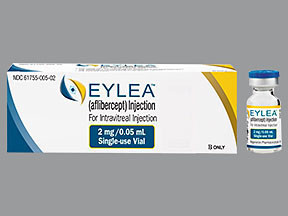AFLIBERCEPT - INTRAOCULAR
PHONETIC PRONUNCIATION: (a-FLIB-er-sept)
COMMON BRAND NAME(S): Eylea
GENERIC NAME(S): aflibercept
Uses
USES: Aflibercept is used to treat certain serious eye conditions (such as wet age-related macular degeneration - wet AMD, macular edema following central retinal vein occlusion, diabetic macular edema). This medication can help preserve vision and prevent blindness. Aflibercept belongs to a class of drugs known as growth factor inhibitors. It works by slowing the growth of abnormal new blood vessels in the eye and decreasing leakage from these blood vessels.
How to use AFLIBERCEPT - INTRAOCULAR
HOW TO USE: This medication is prepared and given by injection into the affected eye(s) by a health care professional. The affected eye is numbed before each injection. After the injection, you will remain in the doctor's office for a while, and your eye(s) and vision will be monitored. The dosage and treatment schedule are based on your medical condition and response to treatment. Your doctor will give you regularly scheduled injections, usually every 1 or 2 months. For the best effect, carefully follow your doctor's directions. Use this medication regularly to get the most benefit from it. Tell your doctor if your condition worsens.
Side Effects
Precautions
Interactions
Overdose
Images
Reviews
Faq for AFLIBERCEPT - INTRAOCULAR
Aflibercept intraocular injection is used to treat certain eye conditions such as wet age-related macular degeneration, diabetic macular edema, and macular edema following retinal vein occlusion.
Aflibercept works by inhibiting the growth of abnormal blood vessels in the eye and reducing the leakage of fluid, thereby improving vision in patients with the mentioned eye conditions.
Aflibercept is administered as an injection into the eye. It is usually given by a healthcare professional in a clinical setting.
The frequency of aflibercept injections varies depending on the specific eye condition being treated. Typically, the initial treatment involves monthly injections, followed by less frequent maintenance injections.
Common side effects of aflibercept can include eye pain, increased intraocular pressure, floaters, conjunctival hemorrhage, and blurred vision. Serious side effects such as infection and retinal detachment are rare but can occur.
The response to aflibercept treatment can vary among individuals. Some patients may notice an improvement in their vision shortly after the first injection, while others may take longer to experience the benefits.
It is generally recommended to have someone else drive you home after receiving an aflibercept injection, as temporary changes in vision may occur.
The safety of aflibercept during pregnancy and breastfeeding has not been established. It is important to consult with your healthcare provider before using this medication if you are pregnant or breastfeeding.
If you miss a scheduled aflibercept injection, it is important to contact your healthcare provider to reschedule the appointment and discuss any necessary adjustments to your treatment plan.
Disclaimer
IMPORTANT: HOW TO USE THIS INFORMATION: This is a summary and does NOT have all possible information about this product. This information does not assure that this product is safe, effective, or appropriate for you. This information is not individual medical advice and does not substitute for the advice of your health care professional. Always ask your health care professional for complete information about this product and your specific health needs.


No Reviews Yet